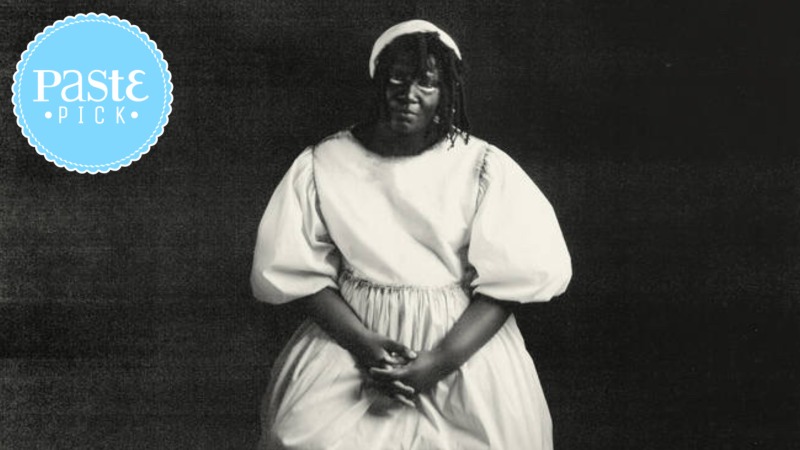Backxwash Interrogates Paradoxes, Mental Illness and Injustice on Only Dust Remains
The songs on the Montreal rapper-producer’s fifth album are caustic, knotty monoliths, as she bedecks her sacrifices with challenging, orchestrated, and cathartic resignations.

Only Dust Remains is an aftermath. True to its title, the record’s 10 songs abandon gentleness, as Backxwash, the stage name of Zambia-born, Montreal-based rapper-producer Ashanti Mutinta, asks loud questions that demand loud answers. Her trilogy of releases between 2020 and 2022—the Polaris Prize-winning God Has Nothing to Do With This Leave Him Out of It and its follow-ups, I Lie Here Buried With My Rings and My Dresses and His Happiness Shall Come First Even Though We Are Suffering—were suspended in the gray area between catharsis and skepticism, illustrating rock bottom and the high-heavens as one and the same. Only Dust Remains lingers in the afterword of its three predecessors.
Mutinta’s music so often oscillates between terrifying, liberating, queer, faith-driven and faith-questioning worlds—caught someplace in-between the self-immolating, blood-curdling divinity of Lingua Ignota, the gaunt ambience of Anna von Hausswolff and the harsh, unfurling bravado of Rico Nasty while experimenting with drone (“Wail of Banshee”), screamo (“TERROR PACKETS”), Zulu chants (“666 in Luxaxa”), post-rock (“DISSOCIATION”) and horrorcore (“Kumoto”) styles. On Only Dust Remains, she conjures everything from the meta-existentialism of Moor Mother, to the prog-rap of Young Fathers, digital intricacies of clipping., and Yeezus levels of damp, brash Auto-Tune. The perspective repeatedly switches between micro and macro, as Backxwash, ever the intergenerational, socio-political magician in rap, casts a spell on Black trans life through gothic, scorched-earth overtures, unpredictable pop tangents and prompt lyrical critiques of global corruption and genocide.
Vicious lead single “Wake Up,” which made an appearance on Paste’s year-end list in December, boils for seven minutes and lends itself to the testimonies of trauma. Loud, swirling and complex samples collapse into a terrifying overture, where Mutinta shouting “WAKE THE FUCK UP!” over and over becomes an instrument added into the mess. Nearly five minutes into “Wake Up,” the melody flips, awakening a chopped-and-screwed gospel sample. Mutinta, bed-bound and deteriorating (“The ceiling is all gaze as I rot away”) into visions of suicide (“‘Cause for now I’ll just divvy the rope and I’ll see if it holds”), near-death defiance (“Throught the blackened skies, I will not go gentle”) and misery (“The Lord forsaketh in awful places, I’m dealing with loss of days”), turns her suffering into a crash-out crescendo.
“9th Heaven” is an electric squash of anxiety, as Backxwash’s flow stretches around a crying vocal sample. She reckons with labor, drugs and purpose. Piano notes twirl like pirouettes, as she summons a “drummer coming,” programming beats into a Biblical ecstasy evoked through mentions of the archangel Gabriel and Adam eating the apple. The tempo grows, as Backxwash chants, “I know where I’ve been, and I don’t know where the fuck I’m going.” “But I can tell you one motherfucking thing, I feel so motherfucking free!” I’m hesitant to call “9th Heaven” a rap song; I’m not so sure that could possibly categorize or encapsulate the magic and craft throbbing and shape-shifting within. Let’s call it like it is instead: “9th Heaven” is a museum.
A synth begins like a lullaby on “History of Violence” before patiently building into an armor of metal drums and Michael Go’s thrashing guitars. “Is Heaven the only semblance of peace?,” Mutinta asks. The song is not just a reflection of her own political climate-inciting agony, or an uncomfortable interrogating of cultural abuse, but an annihilation on global power, corruption and gluttony; Backxwash prosecutes the fascists enabling the ongoing genocide in Gaza, shouting, “From the river to the sea, Palestine will be free!” She condemns the world’s leaders using freedom as a bartering chip; she recalls videos of dying Palestinian children and reckons with what power fuels a slaughtering of innocent children: “These fuckers gonna say it’s all about peace. Check the stats, motherfucker, it’s all about greed.”
-

-

-

-

-

-

-

-

-

-

-

-

-

-

-

-

-

-

-

-

-

-

-

-

-

-

-

-

-

-

-

-

-

-

-

-

-

-

-

-








































